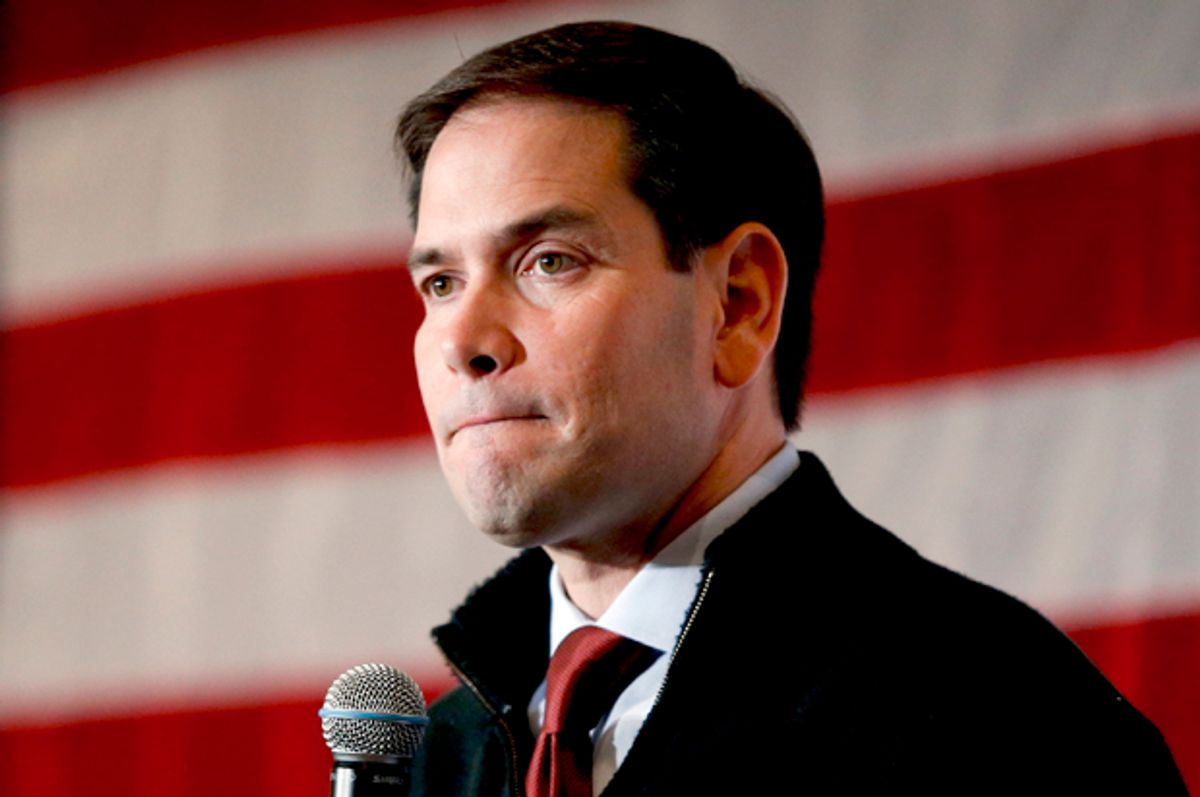Over the past week or so we’ve seen two of the top three Republican candidates for president face some difficult questions about their proposed healthcare policies. At last week’s debate, Ted Cruz was asked by Fox News moderator Bret Baier to explain what he would do to cover people who would lose their insurance should Obamacare be repealed. Cruz dodged the question and instead explained how the free market will magically resolve everyone’s healthcare problems. A couple of days later, Cruz was at a rally in Iowa where a voter confronted him with the story of his brother-in-law who, owing to severe medical problems, had not been able to get insurance until Obamacare was passed. He asked Cruz what he intended to replace Obamacare with, and Cruz said that pre-Obamacare “regulations” prevented the man’s brother-in-law from getting coverage.
In a similar vein, Donald Trump was asked on ABC News this weekend what he intends to do to cover people once Obamacare is repealed, and he offered a still vaguer vision of the Republican healthcare future. “I want people taken care of,” Trump insisted. “If someone has no money and they’re lying in the middle of the street and they’re dying, I’m going to take care of them.” Pressed on what, exactly, that would look like, Trump said “we’re going to work with our hospitals, we’re going to work with our doctors, we’ve gotta do something.”
So the post-Obamacare solution for ensuring coverage, as articulated by two of the top three GOP candidates, is to undo regulations and figure out “something.” But what about the third candidate? What about Marco Rubio? The Florida senator spends the majority of his time talking up his own electability and warning about how dangerous the Islamic State is, so he doesn’t get pressed on healthcare too often. But he should, because his healthcare plan is just as vague and inscrutable as what the other two Republican front-runners have to offer.
The most detailed rundown of what Rubio has in store for healthcare policy is a Politico Op-Ed he wrote all the way back in August. Once you slog through the pro-forma denunciations of the Affordable Care Act, you come to Rubio’s three-part plan for providing affordable health coverage: tax credits to help purchase insurance; “reform insurance regulations” and set up high-risk pools for people with preexisting conditions; and block-granting Medicaid while shifting Medicare to a “premium support system.”
The first question that arises from all this is how Rubio intends to pay for it. “Perhaps most importantly,” Rubio wrote in Politico, his proposals “will not raise taxes on the American people.” So tax hikes are out, which we could have guessed given Rubio’s enthusiasm to sign Grover Norquist’s no-tax pledge. But tax credits cost money, as do high-risk pools, which Rubio says should be “federally-supported.” Those high-risk pools are only effective if there’s a ton of federal cash backing them up (best of luck convincing House Republicans to sign off on that). And keep in mind that Rubio also wants to cut taxes by something like $12 trillion while also creating new tax credits for families while also increasing military spending by $1 trillion while also balancing the budget and decreasing the national debt. None of this math comes anywhere close to adding up, and Rubio hasn’t explained how he’ll pay for his healthcare proposal (or anything else, really).
And, of course, there’s the all-important coverage question. Rubio’s plan has no specifics and makes no claims to covering as many or more people as Obamacare, likely because it can’t. His plan imposes no coverage mandates, it doesn’t set minimum coverage requirements, and it allows insurers to once again discriminate based on health status. The Affordable Care Act expands coverage precisely because it strikes a balance between mandates, regulations and subsidies – you must buy insurance, but you’ll get help paying for it (up to a point), and it will cover a broad range of treatments. Rubio’s plan would do away with all of that, which necessarily means that fewer people would have coverage, and that coverage would be less comprehensive. Repealing the Medicaid expansion would strip millions of low-income people of their newfound health coverage, and block-granting Medicaid will reduce coverage even further by giving states the “flexibility” to dump people from the rolls.
This gets to the lie behind the GOP’s years-long “repeal and replace” mantra. They can’t come to a consensus on what a “conservative” healthcare policy should look like, so they traffic in vaguely defined policy items and hide behind empty slogans about “free-market solutions” and “patient-centered reform.” Not a one of them – including the top three Republican presidential contenders – has offered a true “replacement” for Obamacare because what they’re actually proposing is to kick lots of people off their health insurance with no real solution for getting them covered again.

Shares